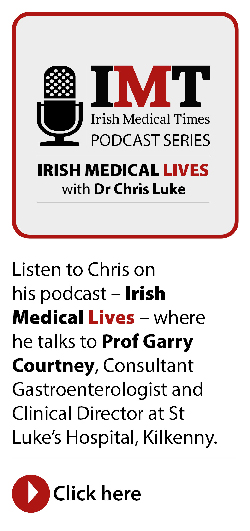Earlier than the ‘examination’ of the Irish pandemic response begins, Dr Chris Luke wish to pre-empt the findings along with his personal recipe for ‘resilience’
We stay in historic occasions, clearly, however the incidence of ‘seismic’ geopolitical occasions of late has been actually dizzying. These previous few weeks have seen a failed assassination try on a former American President, adopted by the present President’s dramatic withdrawal from the following race for the White Home, Israel’s regional-war-threatening assaults on Yemen and the horror present in Gaza, and ‘one of many biggest-ever IT outages…the world over’, on account of a botched CrowdStrike software program replace that affected numerous Microsoft customers within the well being, retail and journey sectors, and their shoppers.
 And, amid this turmoil, got here the primary of at the least 9 reviews into how the UK responded to that uber-seismic world occasion, the SARS-CoV-2 coronavirus pandemic of 2020 – 2023. In her first 240-page instalment, The Rt Hon the Baroness Hallett DBE, Chair of the UK Covid-19 Inquiry, issued an ‘unflinchingly important’ evaluation of the way in which all 4 nations handled the influence of the pandemic, and he or she wrote: ‘The Inquiry has no hesitation in concluding that the processes, planning and coverage of the civil contingency constructions throughout the UK authorities and devolved administrations and civil providers failed their residents.’ (Or, as Tolstoy put it so pithily in Conflict and Peace, ‘Nothing was prepared for the battle that everybody anticipated’.)
And, amid this turmoil, got here the primary of at the least 9 reviews into how the UK responded to that uber-seismic world occasion, the SARS-CoV-2 coronavirus pandemic of 2020 – 2023. In her first 240-page instalment, The Rt Hon the Baroness Hallett DBE, Chair of the UK Covid-19 Inquiry, issued an ‘unflinchingly important’ evaluation of the way in which all 4 nations handled the influence of the pandemic, and he or she wrote: ‘The Inquiry has no hesitation in concluding that the processes, planning and coverage of the civil contingency constructions throughout the UK authorities and devolved administrations and civil providers failed their residents.’ (Or, as Tolstoy put it so pithily in Conflict and Peace, ‘Nothing was prepared for the battle that everybody anticipated’.)
I like to recommend that anybody prone to be concerned in responding to a future pandemic spend the 5 minutes or so required to learn the chief abstract of this primary UK report. And I might notably advise anybody concerned in responding to the Covid-19 pandemic in Eire to learn it, provided that the long-promised ‘examination’ of Eire’s response to the Covid-19 pandemic can have an unbiased panel of specialists appointed by October 2024 (in accordance with the Tánaiste, Mr Martin).
The latter additionally stipulated that the phrase ‘inquiry’ wouldn’t be used, due to the ‘adversarial’ nature of the British inquiry, which spoke to 69 specialists and politicians, and so usually changed into a ‘he-said-she-said’ slanging and finger-pointing train, that generated a lot warmth however little gentle.
Some readers might really feel a bit irritated that I’m suggesting that classes may be discovered on this aspect of the Irish Sea by trying to London, however I’m in little question that what’s discovered there shall be much like what shall be recognized as ‘instructive’ on this nation (and certainly universally), as a result of the findings of Baroness Hallett’s inquiry have been so predictable. And, for comfort, I summarise them right here:
The UK deliberate for the unsuitable pandemic. They have been basically ‘anticipating’ an influenza epidemic, so their already-dubious planning fell aside on first contact with the precise virus inflicting the pandemic, SARS-CoV-2, which is much extra contagious than influenza, and for longer (together with in asymptomatic carriers), way more insidious in its onset, and doesn’t reply to the anti-viral medicine or vaccines used to deal with or stop influenza, though each are respiratory sicknesses.
The ‘UK authorities’s sole pandemic technique, from 2011, was outdated’ (sic), rigid and nearly irrelevant, and didn’t take account of the ‘depleted’ state of the NHS (and most of Britain’s public infrastructure), because of the years of ‘austerity’ that adopted the Nice Recession of 2007-2009. One knowledgeable contributor, England’s ex-Chief Medical Officer, Dame Sally Davies, was very important of the state of the NHS, saying it had fewer docs, nurses, beds and ventilators than comparable international locations.
The UK’s emergency planning typically did not account sufficiently for the pre-existing well being and societal inequalities and deprivation in society, it lacked satisfactory management, coordination and oversight, and its inadequacies have been nearly definitely compounded by the immense UK-wide turbulence (and distraction of civil servants) attributable to Brexit from 2016 onwards.
 The UK did not study sufficiently from previous civil emergency workout routines and outbreaks of illness. As an illustration, it ‘ought to have been paying extra consideration to Asian international locations akin to Taiwan, Singapore and South Korea, which had seen earlier outbreaks of two different coronaviruses, extreme acute respiratory syndrome (SARS, in 2003) and Center East respiratory syndrome (MERS, in 2012).’ These international locations suppressed the preliminary wave of Covid extra successfully, by rolling out focused check, hint and quarantine methods and establishing border controls. This helped enormously to cut back the variety of deaths and restricted using lockdowns.
The UK did not study sufficiently from previous civil emergency workout routines and outbreaks of illness. As an illustration, it ‘ought to have been paying extra consideration to Asian international locations akin to Taiwan, Singapore and South Korea, which had seen earlier outbreaks of two different coronaviruses, extreme acute respiratory syndrome (SARS, in 2003) and Center East respiratory syndrome (MERS, in 2012).’ These international locations suppressed the preliminary wave of Covid extra successfully, by rolling out focused check, hint and quarantine methods and establishing border controls. This helped enormously to cut back the variety of deaths and restricted using lockdowns.
One other damning criticism was that the UK authorities did not act on the suggestions made when the civil service ran ‘Train Alice’, in 2016, simulating a significant MERS (Center East respiratory syndrome coronavirus [MERS-CoV]) outbreak. And an overarching critique was that the planning suffered from ‘groupthink’, and knowledgeable recommendation was sought from far too slim a variety of sources, with too little scope for folks with dissenting views to problem the (alleged) ‘consensus’.
In follow, the consequence of the flawed planning course of was that too most of the 225,000 deaths throughout the 4 UK nations have been avoidable, there have been grossly insufficient shares of non-public protecting gear (PPE) for scientific workers (who usually needed to improvise with plastic bin luggage, and so forth), the foundations and steering have been incoherent and incessantly altering, and the injury achieved to the financial and psychological well being of the nation was far larger than it ought to have been.
Briefly, the poor planning and insufficient preparedness of the UK meant that there was an immense quantity of avoidable struggling (essentially the most devastating being that of the aged, who so usually died alone and with out the consolation or comfort of getting family members by their aspect, and have been buried or cremated with out the traditional farewells), pointless disruption of the social and academic progress of children (lots of whom have been left with enduring psychological well being and academic difficulties), and a dreadful corrosion of the dedication of healthcare professionals (lots of whom skilled extreme ethical damage in the course of the worst days of the pandemic’s influence on the NHS and nursing houses). The latter have been arguably ‘deserted’ by the ‘State’ on the outset of the pandemic.
(At this level of an audition, the cry usually comes, “Don’t bore us, get to the refrain!”.) For brevity, I’ll distil the preliminary suggestions of Baroness Hallett: ‘A brand new UK-wide whole-system civil emergency technique ought to be put in place and it ought to be topic to a substantive reassessment at the least each three years to make sure that it’s updated and efficient, and incorporates classes discovered from civil emergency workout routines’. The brand new preparations shall be overseen by the chief of the federal government (or their deputy), with higher knowledge methods, UK-wide workout routines each few years, ‘crimson groups’ deployed to problem groupthink, common suggestions from the thrice-yearly simulation, and larger ‘whole-system resilience. And so forth and so forth.
I don’t imply to sound sceptical, however quite a lot of this report’s content material comes right down to (well-intentioned) tales of the bleeding apparent. Or, as we used to place it once I laboured within the trenches, the ‘clearly bleeding’. All this deliberation could be attention-grabbing and the suggestions compelling if it weren’t for the continued dysfunction of a lot of the British state, exemplified by low-speed railway building, crumbling hospitals, faculties, and parliament, bursting prisons, and the failure to construct sufficient homes for a quickly increasing inhabitants. After which there was the Nice Outage final week, which meant that tens of hundreds of individuals couldn’t get GP appointments, journey by air or rail, or make industrial transactions because of the CrowdStrike anti-virus software program. Or we may look a little bit bit additional again on the entire enterprise of well being service disruption by Russian hackers (bear in mind the WannaCry cyberattack on the NHS in 2017 or, extra regionally, the HSE ransomware assault in 2021?).
 Earlier than the ‘examination’ of the Irish pandemic response even begins, then, I’d prefer to pre-empt the findings with my very own recipe for ‘resilience’, upfront of the following main medical viral or antiviral disaster. So: make sure that paper and pen are at all times out there, within the occasion of an web or energy outage. Maintain a battery-powered radio handy, and additional powerpacks to your cellphone. Maintain scanning the horizon earlier than and behind you for potential threats. Keep in mind: the additional again you look, the additional ahead you’ll be able to see (e.g. a Dengue epidemic or cyberattack). Be sure you have a genuinely big selection of pals, in excessive locations and low, so that you hear all of the rumours of bizarre developments or illnesses, and you’ve got the widest vary of experience you’ll be able to name upon, whatever the specifics of the following calamity. This implies being sincere, humble and sort to folks round you – earlier than, throughout and after the disaster. You by no means know while you would possibly want that colleague or (office) neighbour. And at last, right here’s an unashamedly partisan shout-out: don’t neglect to incorporate the emergency physicians amongst your closest pals! They’re the true deal relating to disaster administration.
Earlier than the ‘examination’ of the Irish pandemic response even begins, then, I’d prefer to pre-empt the findings with my very own recipe for ‘resilience’, upfront of the following main medical viral or antiviral disaster. So: make sure that paper and pen are at all times out there, within the occasion of an web or energy outage. Maintain a battery-powered radio handy, and additional powerpacks to your cellphone. Maintain scanning the horizon earlier than and behind you for potential threats. Keep in mind: the additional again you look, the additional ahead you’ll be able to see (e.g. a Dengue epidemic or cyberattack). Be sure you have a genuinely big selection of pals, in excessive locations and low, so that you hear all of the rumours of bizarre developments or illnesses, and you’ve got the widest vary of experience you’ll be able to name upon, whatever the specifics of the following calamity. This implies being sincere, humble and sort to folks round you – earlier than, throughout and after the disaster. You by no means know while you would possibly want that colleague or (office) neighbour. And at last, right here’s an unashamedly partisan shout-out: don’t neglect to incorporate the emergency physicians amongst your closest pals! They’re the true deal relating to disaster administration. ![]()